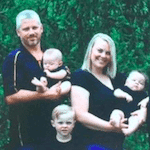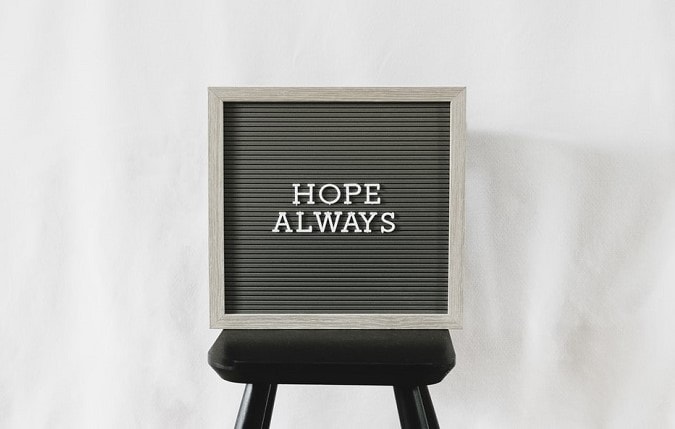Last updated on September 28th, 2021 at 01:27 pm
Is dealing with infertility causing you invisible trauma? We sat down with Rebecca Huls, MS, LPC to talk about addressing infertility trauma.
An aching void, unseen defeat, days, months, weeks, and sometimes even years of trying. Infertility, a seemingly taboo word, and complex topic. Explained and unexplained. Bringing to light the invisible trauma of dealing with infertility is a daunting task for a writer who has never personally waded through the emotions of infertility. Furthermore, it almost feels contrived to even attempt to portray the raw feelings of dealing with infertility since I have never nursed those deep wounds. While there are countless resources available to couples experiencing infertility, I can only hope that one more article, one new perspective, or one new thought could provide comfort or coping strategies if you are living through infertility.
I had the privilege of interviewing Trauma Specialist, Rebecca Huls, MS, Licensed Professional Counselor, and EMDR Certified Therapist. Rebecca is a fellow twin mom managing her own busy household while she juggling a rewarding career. She says she spends her days “sitting in and relishing in the human process of fumbling through and being curious about ourselves.” Clients seek guidance from Rebecca for any number of reasons such as life transitions, mood disorders, and trauma. For the purposes of this article, we discussed trauma at length. We talked about why and how it may appear when dealing with infertility.
Types of Trauma
Ashley: What is the definition of “trauma?”
Rebecca: “A body’s reaction in the present to something that has occurred in the past. The occurrence could be a singular event or a series of events.”
Ashley: Are there different types of trauma?
Rebecca: “We have identified and refer to trauma in two ways: ‘Big T’ trauma and ‘Little T’ trauma.”
Ashley: Tell me more about what that means? Can you provide examples?
Rebecca: “Big T” trauma is a clearly defined moment that would be widely accepted as an overtly traumatic event. “Big T” events can be a car accident, the death of a loved one, a physical assault, witnessing an accidental death, etc. These would all be moments that most people would define as traumatic without much thought.
Rebecca: “Little T” trauma is less widely acknowledged and is not as easily recognizable because it is not one singular defining moment. It is a series of events, experiences, or happenings that over time, culminating in trauma.
Are you considering another baby after twins and infertility? See what one twin mom says about trying again here.

Dealing With Infertility Can Cause Trauma
Ashley: What type of trauma would dealing with infertility be?
Rebecca: “Unexplained infertility may be categorized as “Big T” trauma or “Little T” trauma.”
Ashley: Over time, with each negative pregnancy test, with each doctor’s visit, and with each new test result, the trauma (body’s physical response) becomes more prevalent. Only, there is not often one single defining event to point to. There is no visible proof to bystanders that can “explain” or “define” why a couple might be experiencing invisible trauma while dealing with infertility.
Much like grief, we also acknowledge that not everyone experiences and processes trauma the same way. What is traumatic for one, might not be traumatic for another. This disconnect can cause tension, anger, sadness, isolation, stress, and other emotions. When dealing with infertility, these dynamics can be amplified in romantic partners and close support systems who “just don’t get it.”
Seemingly Innocent Questions can Hurt When Dealing With Infertility
When I was a mom with one child, all the “well-wishers” of the world asked, “Isn’t it time for Baby #2?” “Aren’t you going to try for a girl?” “Don’t you want more kids?” These questions are overwhelming and emotionally taxing for people without the stress of dealing with infertility. But I can’t imagine what that feels like for someone who is already dealing with infertility!
If a couple chooses to disclose to the world that they’re experiencing infertility, the questions shift from, “Aren’t you/When are you…” to advice like, “Just relax, it’ll happen when the time is right…” or, “I know so-and-so had great experience with this drug…” or, “At least you have one healthy child…” People try to “explain away” the emotions, experiences, and trauma that are PERFECTLY ACCEPTABLE, NORMAL, and HEALTHY to acknowledge.
Are you struggling to deal with newly discovered infertility? See what one mom says she learned from her infertility journey here.

Supporting a Friend Dealing With Infertility
Ashley: What is a better alternative to educate people on what to say to someone dealing with infertility?
Rebecca: “For those looking for a better alternative to your old go-to well-wishing motto, try saying, ‘I can’t imagine what you are going through,’ or ‘That must be really hard, tell me more about how you’re feeling…’ and leave space for a response. Consequently, if they are open to replying, engaging in a genuine conversation about infertility may solidify the bond and respect you share for one another.”
Ashley: What treatment have you found effective for processing and overcoming traumatic events?
Rebecca: “Counseling is an effective strategy for processing trauma associated with infertility. It provides individuals and couples ‘space’ to explore their emotions, feelings, reactions, and behaviors. Acknowledging and validating their trauma with infertility, or overcoming infertility, makes it less intimidating, awkward, and taboo. Many times, people dealing with infertility do not necessarily need advice, they just need someone to ‘hold space’ for them. They need someone to acknowledge that what they are experiencing is real.”
Struggling with infertility and other invisible trauma? Check out our podcast episode for FREE to get more information about dealing with your trauma.

A Counselor is a Great Resource for Dealing With Infertility
Ashley: How do you find or select a therapist or counselor?
Rebecca: “Evaluating a therapy partner or counselor to work through the invisible trauma associated with infertility should be like finding a co-explorer. The counselor or therapist should ask meaningful questions, giving one the compass to explore. They should provide the infrastructure to learn independently. Therapists and counselors are not there to give answers or to ‘fix’ anything. I recommend doing individual and couples therapy. What ‘Partner A’ experiences as trauma, may not be the same for ‘Partner B.’ It is important to work through trauma first as an individual, and then together with a partner to discuss what both are overcoming.”
The Support of Others Who Have Been There Can Help
Ashley: Do you find that people bond over similar traumatic events?
Rebecca: “We know that connecting with others who have similar experiences can be a healthy option. Finding a support group online or in-person group therapy could be a positive influence that models ways to handle invisible trauma from dealing with infertility. However, be aware that doing group therapy or participating in online groups can cause triggers. This may lead to negative feelings if other people try to ‘one up’ each other’s trauma. Trauma is trauma. Personal feelings are valid, and other people cannot negate an individual’s experiences no matter what their experience was.”
Ashley: What are some commonalities you find universal to trauma?
Rebecca: “Trauma generally encompasses one of three things: safety, empowerment/control, or connection. With invisible trauma and infertility, it is seemingly related to ‘empowerment/control’. In other words, what one is willing to happen and naturally happens for others, seems to be a struggle for them. We know that infertility can be explainable or unexplainable. In either scenario, the lack of control can create an environment ripe for trauma, guilt, grief, anxiety, depression, and more.”
Don’t miss another Twiniversity post! Subscribe to our email list now!

Ashley: Dealing with infertility is ripe with uncertainty. Will it happen this month? Will we need more doctor visits? How much money is this going to cost? Will this treatment even work? We honor the courageous moms and dads who bravely face the unknown. The ones who agree that infertility won’t win and who will find a solution no matter the creative solution or cost.
Everyone Has Their Own Way of Dealing With Infertility
Infertility does not always result in trauma. Sometimes, it results in a more beautiful beginning than “planned.” Among us, we have infertility warriors who chose a different path – pouring themselves into foster care, engaging in surrogacy, tackling the ups and downs of adoption, becoming volunteers and mentors. They did not let dealing with infertility have the final say. In fact, they have faced their ugliest breakdowns and built beauty from it.
Whether you have grappled with infertility in the past, or you are dealing with infertility now, please know that you are seen. You are not broken. You are allowed to feel what you are feeling. While it can be traumatic, please be encouraged knowing there are people who can and want to, help. This is not the end of your story.
Meet Rebecca Huls, MS, LPC BIO
 Rebecca is a Licensed Professional Counselor in the State of Georgia (LPC #009825) and EMDR Certified Therapist with EMDRIA with a passion for helping others find their freedom. Freedom from trauma, freedom from being overwhelmed, freedom from destructive behaviors, and freedom from the cycle of avoidance and pain. Rebecca has a Bachelors Degree in Psychology and Masters of Science in Mental Health and Psychological Therapies. She has an eclectic background in both Public and Private Mental Health Services in the USA and UK. She has held positions as an Assistant Psychologist, Needs Assessment Specialist, Behavioral Technician, and now works as a Therapist in Private Practice. Rebecca is a mother of three children, ex-pat of the UK, and is passionate about the arts and music. She enjoys running and teaching Colorguard in her free time.
Rebecca is a Licensed Professional Counselor in the State of Georgia (LPC #009825) and EMDR Certified Therapist with EMDRIA with a passion for helping others find their freedom. Freedom from trauma, freedom from being overwhelmed, freedom from destructive behaviors, and freedom from the cycle of avoidance and pain. Rebecca has a Bachelors Degree in Psychology and Masters of Science in Mental Health and Psychological Therapies. She has an eclectic background in both Public and Private Mental Health Services in the USA and UK. She has held positions as an Assistant Psychologist, Needs Assessment Specialist, Behavioral Technician, and now works as a Therapist in Private Practice. Rebecca is a mother of three children, ex-pat of the UK, and is passionate about the arts and music. She enjoys running and teaching Colorguard in her free time.
 Ashley Worley is mom to three boys – Cameron (age 6), and twins Turner and Jensen (1-year-olds). In her spare time, she’s gated in the living room corralling twins… and once upon a time could be found on the golf course, coaching baseball, cooking delightful comfort food, or competing with her husband in a {mostly} friendly rivalry of darts, ping pong, archery, or firearms.
Ashley Worley is mom to three boys – Cameron (age 6), and twins Turner and Jensen (1-year-olds). In her spare time, she’s gated in the living room corralling twins… and once upon a time could be found on the golf course, coaching baseball, cooking delightful comfort food, or competing with her husband in a {mostly} friendly rivalry of darts, ping pong, archery, or firearms.







